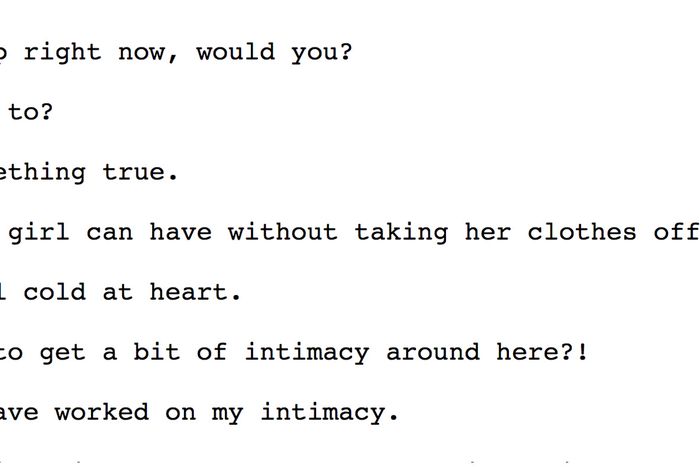
Up till now, I have used this column for (mostly) chaotic good. I have written about lines that make no sense and lines that make too much sense. Today I have decided to use this column for not-good — some would even say evil. We are gathered here today, my social-distancing gremlins, to talk about a movie about the emotionally distant, the sexy-but-broken, the hot-but-mean. We are talking about Closer.
It’s hard to explain how this movie lodged itself in my subconscious. In 2004 I was, according to my records, 10 years old. I was pretentious and obsessed with awards shows and acclaim, and Closer had just won two Golden Globes of five nominations. (This was back when I took the Golden Globes seriously, as only a child would.) Like a horsefly to one of those sticky strips of bug-catching tape, I was drawn to this movie, or even just the idea of it. Does this happen to anyone else? You love the idea of the thing before you even have a clear understanding of what the thing is? This is how I felt about Closer: Something about it seemed very serious and grown-up, and serious and grown-up was what I wanted to be. I feel the same way about the idea of silk blouses.
Closer, Mike Nichols’s movie adaptation of the Patrick Marber play, is an exercise in pure cleverness, a collection of vicious one-liners. It is the anti–romantic comedy: Four movie stars run around hurting each other’s feelings. No one in this movie is happy or healthy or satisfied. Everyone in this movie is lonely and desperate and whimpering for attention. Every line of dialogue is slippery and seductive all at once. Natalie Portman is Alice, a cherubic 20-something barista-stripper. She delivers every line as a declaration: “I don’t love you anymore, good-bye,” “Hello, stranger,” “I’m waiting for you to leave me.” Jude Law is Dan, a moody obituarist with a chip on his shoulder. Clive Owen is Larry, an obnoxious dermatologist with an even bigger chip on his shoulder. Julia Roberts is Anna, a lonely, dejected American photographer living in London. The quartet plays musical chairs in each other’s beds and with each other’s hearts: Dan kisses Anna but loves Alice; Anna marries Larry but lets Dan stand a little too close and whisper insults in her ear. Dan and Larry play tug-of-war with Anna and Alice; Alice and Anna run an assembly line of their own schemes.
The couples run parallel to each other until they crash: Anna leaves Larry for Dan, who, late one night, stumbles into the strip club where Alice dances. It’s the scene that launched a thousand Tumblr photosets, and I have eagerly gobbled up every single one. In a private room where the Smiths plays, Alice strips for Larry as he interrogates her. She’s wearing a wig the color of a flamingo and a lilac thong; he’s in a stupor of self-hate: “I love you,” he whimpers as she puts her shimmering bra back on. “Thank you,” she replies. (I’ve always found the coldness and practicality of her lines intoxicating, the way she refuses to engage with his faux sentimentality.) He talks in circles about love and heartbreak and gender, a monologue full of first semester freshman year observations. Alice listens politely but plays with him. There are trapdoors in every exchange: Larry wants company, but he also covets something he thinks belongs to another man.
“Alice,” he presses, “tell me something true.”
She doesn’t even take a moment to consider. “Lying is the most fun a girl can have without taking her clothes off,” she smirks. “But it’s better if you do.”
To be clear: I’m not sure this makes even one single lick of sense. And yet, I cannot get enough of it. “Lying is the most fun a girl can have without taking her clothes off … but it’s better if you do!” It’s hot. I wish I could say such a thing, so sexy so faux clever! It sets all my synapses ablaze. Give me a quartet of hot people kissing and lying and hurting one another’s feelings. Give me empty declarations and toxic promises. “‘Eww she fuck the weed man for weed’ — a bitch that’s fucking the Text man for Texts,” reads one of the most prophetic tweets of our time. Enter Closer, a movie about fucking the lying men for lies. The women in this movie know that relationships — especially these forlorn ones — are transactional; the men catapult themselves to the next high. There is something oddly comforting about seeing people behave badly and cruelly with the veneer of cleverness in nice apartments. Suddenly my own mistakes don’t seem quite so dramatic, and for once I appreciate being outdone.
I have been known to sow a lot of chaos in my personal, professional, and internet life. I maintain a long-running fanfiction about an erstwhile romance between Rihanna and Leonardo DiCaprio at the request of absolutely no one. One time I went on a date to a slam-poetry reading, and it wasn’t clear to me until far too late into the night that this man I was with was wearing rings. (We obviously did not see each other after this realization.) I lose hours each day scrolling through memes on the internet. I led a middle-school book club that honored Gossip Girl. Nothing I can do reaches Closer’s level of psychotic, horny self-sabotage. Alice is talking about lying and taking your clothes off! These are two chaotic instructions. It gives me a weird little sense of warped satisfaction that this movie is where all of my worst impulses are living their best lives: self-interest, self-obsession, self-destruction. Finally they are given a place to flourish and reach their full potential.
Lying is the most fun a girl can have without taking her clothes off? But it’s better if you do? Oh, girl. I’m wearing sunglasses indoors. I’m texting someone back I shouldn’t. We’re acting up and acting out today! It was good enough for Panic! At the Disco and it’s good enough for me. There’s a self-satisfied sex appeal, an arrogant smugness to this line. And yet, “Lying is the most fun a girl can have without taking her clothes off,” I say aloud, to no one in particular. “But it’s better if you do.” You know you had to do it to ‘em, Natalie Portman!



